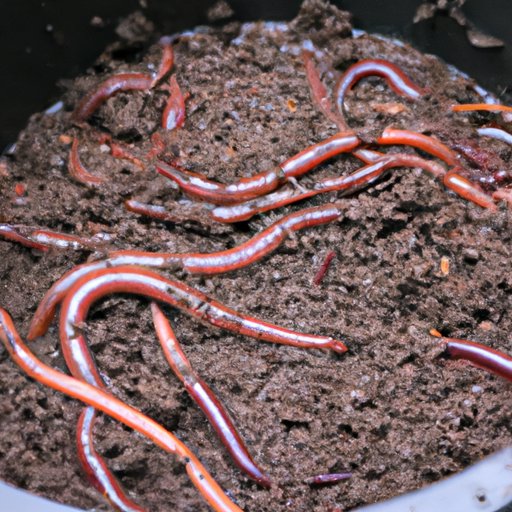
I. Introduction
Worms are fascinating creatures that play vital roles in the ecosystem. They are beneficial for gardens, composting, and even fishing. But how do you get worms? There are several ways to obtain worms, and this article will explore the most common methods.
II. How to Start Your Own Worm Farm and Gather Quality Worms
One way to acquire worms is to start your own worm farm. Not only does this provide you with a steady supply of worms, but it also enables you to ensure their quality and health.
To set up a worm farm, you will need a container, bedding material, and a population of worms. A common container choice is a plastic bin with holes drilled into it for ventilation. The bedding material can be shredded newspaper or cardboard, peat moss, or coconut coir.
Next, you will need to select the right type of worms. Red wigglers or Eisenia fetida are the most commonly used species for composting and worm farming. They are easy to care for and reproduce quickly.
Once you have your worm farm set up, it’s important to maintain it properly. Worms need a moist environment, so you will need to add water occasionally. They also require a food source, such as fruit and vegetable scraps or coffee grounds. Be careful not to overfeed your worms, as this can attract pests and cause odors.
III. The “Dirt” on Where to Find Earthworms for Gardening
Earthworms are beneficial for garden soil, as they help to aerate the soil, increase nutrient availability, and improve drainage. If you don’t want to start your own worm farm, you can still obtain worms for your garden by looking in the soil around your house or community.
Some places to find free earthworms include under logs, rocks, and leaf litter. You can also check in compost piles, as earthworms are often naturally attracted to them. If you do relocate earthworms, it’s best to do so during the evening or on a cloudy day to reduce stress on the worms.
IV. Fishing for Answers: The Science Behind Baiting Fish with Worms
Worms are one of the most common baits used for fishing. They can attract a variety of fish, including panfish, bass, and trout. But why are worms so effective as bait?
The movement of worms in the water can grab the attention of nearby fish, making them more likely to strike. Earthworms can also emit a scent in the water that fish are attracted to.
To use worms as bait, it’s important to select the right type and prepare them properly. Nightcrawlers or dew worms are larger worms that work well for larger fish. Red wigglers or red worms are a smaller option that can be used for a wider variety of fish.
To prepare worms for fishing, you can either thread them onto a hook or simply let them dangle freely on the hook. It’s important to keep worms moist to ensure their survival, so keep them in a container with damp soil or paper towels until you are ready to use them.
While worms are a popular bait, there are other options available as well. Lures, such as artificial worms, can be used to imitate the movement of real worms in the water. Other live baits, such as crickets or minnows, may be preferred in certain fishing situations.
V. A Guide to Composting with Worms: Starting Your Own Vermiculture
Vermicomposting is a type of composting that uses worms to break down organic material into nutrient-rich soil amendments. This method can be an efficient and easy way to compost food scraps and yard waste.
To start vermicomposting, you will need a container, bedding material, worms, and organic waste. A plastic bin or wooden box works well for a container. Bedding material can be shredded newspaper or cardboard, peat moss, or coconut coir. Red wigglers or another species of composting worm can be used for the process.
As with worm farming, it’s important to maintain the right conditions for your worms. Keep the bedding moist, but not waterlogged, and add organic waste in small quantities to avoid spoilage and odors.
Vermicomposting has several advantages over traditional composting. Worms can break down organic material more quickly than bacteria alone, resulting in a faster composting process. Additionally, vermicomposting produces a higher quality compost that contains more nutrients and beneficial bacteria.
VI. Worms for Sale: Where to Buy Worms for Your Home Garden or Lawn
If you don’t have the time or resources to start your own worm farm, you can also buy worms from a supplier. This option ensures that you are getting worms of a specific type and quantity.
There are many reputable worm suppliers available both online and in store. Look for suppliers that specialize in the type of worms you need and have good customer reviews.
When selecting worms for your garden or lawn, consider the size of the area you want to cover and the type of soil you have. Red wigglers are a good option for composting and gardens, while nightcrawlers are better suited for lawns and deeper soil.
VII. Conclusion
Worms can be obtained in many ways for different purposes such as gardening, composting, or fishing. Whether you decide to start your own worm farm, look for earthworms in your garden, or buy worms from a supplier, there is a method that will work for you. By following the techniques discussed in this article, you can ensure that your worms are healthy and your gardens, compost, and fishing trips are successful.
So, what are you waiting for? Try out one or more of these methods and share your experiences in the comments below or on social media platforms.




